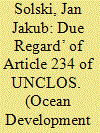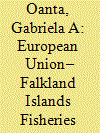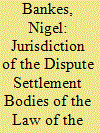|
|
|
Sort Order |
|
|
|
Items / Page
|
|
|
|
|
|
|
| Srl | Item |
| 1 |
ID:
188220


|
|
|
|
|
| Summary/Abstract |
Article 234 of UNCLOS is in many ways exceptional, but it is not unique in the sense that it grants to the coastal state “complete” legislative power. Arguably, “complete” coastal state jurisdiction exists in the territorial sea for the purposes enumerated in Article 21(1), allowing coastal states to adopt ship reporting systems, pilotage, and other routing measures unilaterally. The analysis of state practice reveals that states often decide to engage the International Maritime Organization (IMO) in different ways, even when such a course of action is not mandatory. This article advocates for meaningful deliberation as both a suitable method of meeting Article 234’s due regard standard, and a practice that can be expected from a steward.
|
|
|
|
|
|
|
|
|
|
|
|
|
|
|
|
| 2 |
ID:
188217


|
|
|
|
|
| Summary/Abstract |
This article analyzes fisheries relations between the European Union and the Falkland Islands from a legal perspective, paying special attention to the impact of the United Kingdom’s withdrawal from the European Union on the fishing carried out in this British Overseas Territory. Following a brief overview of the fishing conducted in these controversial waters and internationally disputed maritime zones, it examines European Union–Falkland Islands fisheries relations, first until 31 December 2020, and second in the wake of Brexit, with particular emphasis on those measures (mitigation and treaty based) that the European Union might take now that the United Kingdom is no longer a member.
|
|
|
|
|
|
|
|
|
|
|
|
|
|
|
|
| 3 |
ID:
188221


|
|
|
|
|
| Summary/Abstract |
As “the Constitution for the Ocean,” the 1982 United Nations Convention on the Law of the Sea (UNCLOS) provides a general normative framework for the regulation of ocean space. The finer details and specific obligations contained in UNCLOS are elaborated through the use of various techniques and mechanisms—one of which is the “rule of reference.” The “rule of reference” is a technique that incorporates existing rules and standards contained in external instruments into UNCLOS. As such, the rule of reference raises interesting questions regarding the extent to which it allows UNCLOS to deal with challenges that are not—or not sufficiently regulated—under the Convention. Such an inquiry requires a balancing exercise between, on the one hand, the cardinal principle of state consent under international law and, on the other, the need for UNCLOS to grow and adapt to new challenges. This article seeks to address this balance through the application of the rule of reference to two current challenges to the oceans, namely, climate change and conservation of marine biodiversity, in order to identify the room available for and the limits of using the rule of reference to expand the environmental regulatory scope of UNCLOS.
|
|
|
|
|
|
|
|
|
|
|
|
|
|
|
|
| 4 |
ID:
188218


|
|
|
|
|
| Summary/Abstract |
Part XV of the United Nations Convention on the Law of the Sea (UNCLOS) establishes a system for compulsory and binding dispute resolution. Article 288(2) of UNCLOS allows the dispute resolution system of Part XV to be used by the parties to another international agreement in accordance with the terms of that other agreement, as long as that agreement is related to the purposes of UNCLOS. This article examines the treaty practice under Article 288(2) to assess how those other agreements (which are mostly regional fisheries management organization agreements) provide for access to Part XV. The article examines these agreements within the following analytical framework: (1) Are these agreements related to the purposes of UNCLOS? (2) What jurisdiction, ratione materiae, do the agreements confer on the court or tribunal? (3) How do the agreements provide for submission? (4) How do the agreements deal with applicable law issues? (5) How do the agreements deal with the availability of provisional measures?
|
|
|
|
|
|
|
|
|
|
|
|
|
|
|
|
| 5 |
ID:
188222


|
|
|
|
|
| Summary/Abstract |
This study proposes a legal framework for the successful operation of maritime autonomous surface ships (MASS). It discusses the legal status of a remote operator of MASS, and the possibility of granting them status as a ship employee or master. This research argues that the status of seafarer or deemed seafarer should be required for R-level MASS, and the status of master or deemed master with the right to command in matters relating to ship operation be conferred for RU- and A-level MASS. The study presents an expanded notion of seafarers by extending the combination of ship and human elements—concerning seafarers in existing international maritime conventions—to deem remote operators of MASS ship employees. Further, it suggested that remote operators be regarded as a human element by perpetuating the notion of the master, retaining their status as the final entity of responsibility for the ship, even if the cutting-edge information and communication technology (ICT)-based commercialization of MASS is realized.
|
|
|
|
|
|
|
|
|
|
|
|
|
|
|
|
| 6 |
ID:
188219


|
|
|
|
|
| Summary/Abstract |
Ireland was one of the earliest states to proclaim, in 1959, straight baselines around parts of its coast. This exercise was fundamentally flawed because the linking points of the baselines specified by coordinates at the time had no chart data attached, so that, for example, the extent of the claimed Irish territorial sea (or other zones) could not then be accurately determined. This deficiency around the Irish coastline was belatedly rectified with respect to the straight baselines on the north, west, and south coasts by a statutory instrument of 2016. Furthurmore, the lack of published closing lines on the east coast respecting the three major bays was recently remedied by a statutory instrument of 2019 indicating the closing lines of the same. Despite these welcome clarifications, ambiguities and possible legal problems still relate to Irish baselines.
|
|
|
|
|
|
|
|
|
|
|
|
|
|
|
|
|
|
|
|
|